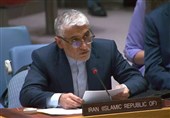Australia Warns against Assuming All Attacks “Terrorism” after Munich Shooting
TEHRAN (Tasnim) - The Australian attorney general, George Brandis, is urging calm after the Munich mass shooting, saying the word “terrorism” should not be used too loosely.
He said it was too early to be definitive about the motives of the German gunman, especially when a search of the man’s home did not find any terrorist-related material, or any other political, religious or ideological material.
German police say an 18-year-old man who killed nine people at a Munich shopping centre on Friday night did not seem to be radicalized.
He was obsessed with mass killings, owned a book on US school shootings and played computer shooting games. Most of his victims were fellow teenagers, five of them under 16.
The incoming Australian senator Pauline Hanson was quick to take to her Facebook page on Saturday morning – just hours after the Munich shooting – to suggest that religion was a motivating factor.
“We’re waking up again to what appears to be another terrorism attack in Munich, Germany,” she wrote. “Let’s see which ‘peace loving’ religion is behind this latest attack.”
“It’s very important to be careful in our use of language,” Brandis told the ABC’s Insiders program on Sunday, the Guardian reported.
“Not every mass casualty attack is an act of terrorism. Not every premeditated act of violence is an act of terrorism,” he said.
“Our law has a very specific definition of terrorism. Terrorism is an act of violence or a threat of violence perpetrated for a political, religious or ideological cause, to coerce government or to intimidate the public.
“If we’re going to understand this problem we have to anatomize it correctly. We must be very careful in our use of language so that we don’t spray the word terrorism around too loosely.”
Brandis also said events such as the shooting in Munich were very difficult to predict and lone gunman who self-radicalize are “the most difficult people to pick up.”
“One of the phenomena that we have seen develop more recently is the development of lone actors who self-radicalize, often very quickly, most commonly online,” he said. “Very frequently these are young men with psychological disturbances, they don’t fit into the conventional or traditional understanding of a terrorism network.”






